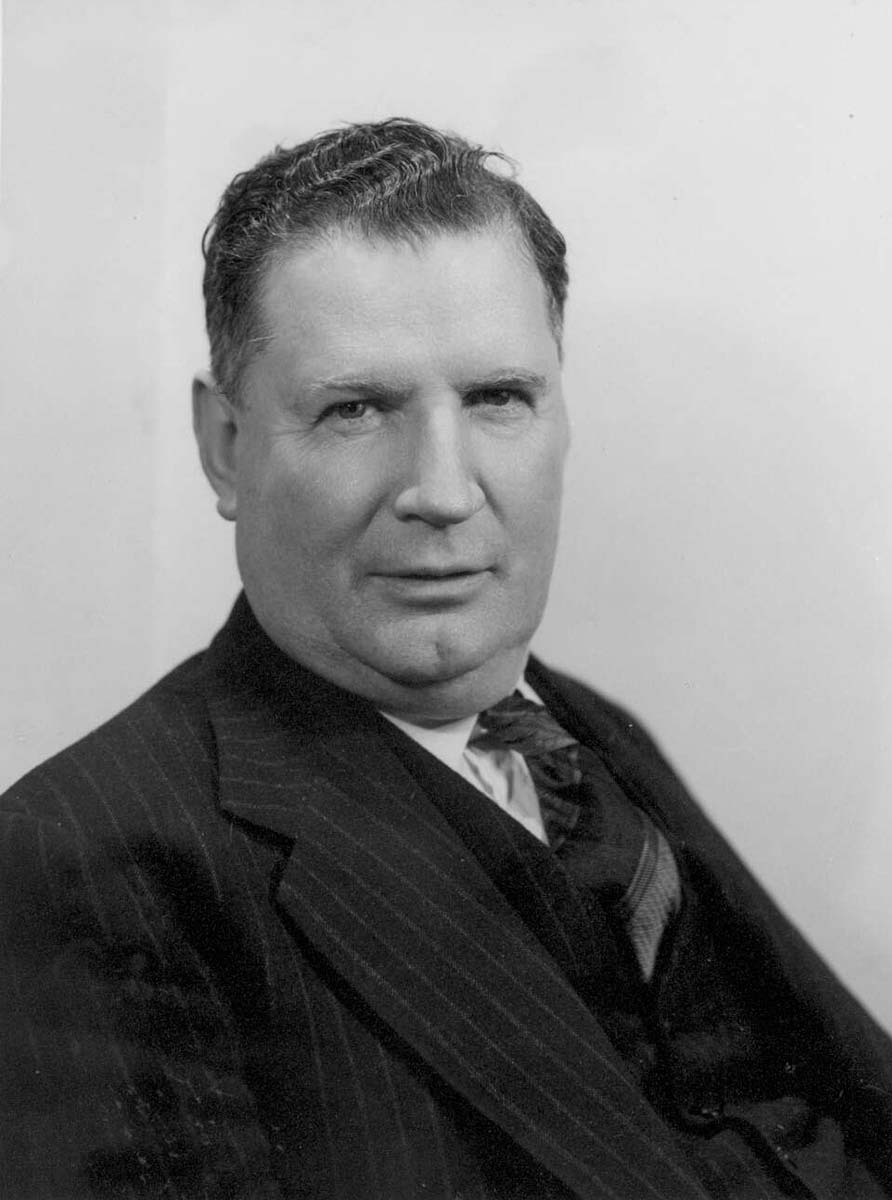Australia’s 13th Prime Minister

29 August 1941 to 7 October 1941
Arthur Fadden was the only member of the Country Party to become Prime Minister of Australia in a permanent rather than a ‘caretaker’ capacity.
Fadden became Prime Minister after Menzies resigned in 1941 but, less than six weeks later, his government was defeated on the floor of the House of Representatives.
Fadden's beginnings
Arthur William Fadden was born in Ingham, Queensland, on 13 April 1895. He was the son of Richard Fadden, an officer in charge of the Mounted Police at Walkerston, near Mackay.
After primary education at Walkerston Public School he became ‘billy boy’ to a cane-cutting gang at 15. Later he joined the staff of Pleystowe sugar mill.
At 18 he became Assistant Town Clerk of Mackay Town Council, and was appointed Town Clerk in 1916. He studied accountancy, and from 1918 practised as an accountant in Townsville, where he later became an alderman on the city council.
He married Ilma Thornber in 1916, and they had four children.
In 1932 he was elected to Queensland state parliament, but lost his seat in the 1935 general election after serving one term.
Fadden's entry into federal politics
Fadden was elected to federal parliament as the Country Party (CP) candidate for the seat of Darling Downs in a by-election in 1936, replacing Sir Lyttleton Groom, who had died. He retained the seat through the next four general elections in 1937, 1940, 1943 and 1946.
After electoral redistribution he won the McPherson seat in the 1949 general election, and held it through the next three general elections in 1951, 1954 and 1955.
Australia entered into the Second World War on 3 September 1939, and the period from 1939–1941 was one of instability in federal government. It was marked by conflict between the United Australia Party (UAP) and Country Party coalition partners, and by power struggles within each party, with the leadership of each changing several times.
In October 1940, when AG Cameron quit leadership of the Country Party, Earle Page and John McEwen contested the leadership, resulting in a tied vote. Fadden, as Deputy Leader, was appointed ‘Acting Leader’ to break the deadlock. He was confirmed as Country Party Leader on 21 March 1941 and retained the position for the next 17 years.
Fadden served as Minister Assisting the Treasurer and Minister for Supply and Development in the Robert Gordon Menzies United Australia Party–Country Party coalition from March–August 1940, then as Minister for Air and Minister for Civil Aviation from August–October 1940, and finally as Treasurer from October 1940–August 1941. He was a member of the war cabinet and economic cabinet from 1940–1941.
In January 1941 Fadden became Deputy Prime Minister for four months while RG Menzies was overseas. After increasing dissension within the UAP-CP coalition, Menzies resigned as Prime Minister on 28 August 1941 in favour of Fadden.
Prime Minister Arthur Fadden
Fadden served as Prime Minister from 29 August to 7 October 1941. By October he had lost support of two Independents who voted with Labor to defeat his government in the House, thus making way for John Curtin’s Labor government.
Except for the periods in office of three caretaker Prime Ministers (Earle Page, Francis (Frank) Forde and John McEwen), Fadden’s 40 days as Prime Minister was the shortest of any Prime Minister in the 20th century.
Fadden's later political life
On the return of Menzies as Prime Minister at the general election in December 1949, Fadden was appointed Deputy Prime Minister and Treasurer in Menzies’ Liberal–Country Party coalition government.
Fadden’s second period as federal Treasurer 1949–1958 was a period of rapid economic growth, expanding population, industrial development, rising levels of education, improved standards of living, low unemployment and the beginning of the ‘long boom’ of the immediate postwar decades.
Fadden was Acting Prime Minister on six occasions during 1950–1957 during Menzies’ absences on overseas travel. At times, he spent several months in the position.
His period as Menzies’ loyal Deputy Prime Minister and Treasurer was typified by such close cooperation between their parties that to many observers the coalition appeared to function as a single party.
Fadden retired from parliament in December 1958 at the height of his political power. His position as Country Party leader was taken by John McEwen.
Fadden's life beyond politics
Fadden was a notable raconteur, and in retirement he published his memoirs, They Called Me Artie (1969). He also wrote an account of his short time as Prime Minister, ‘Forty Days and Forty Nights’, which was published in Australian Outlook in 1973.
He died in Brisbane on 21 April 1973.
In our collection